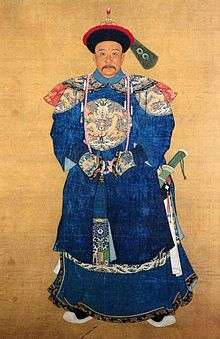Fuheng
Fuheng (Chinese: 傅恒; pinyin: Fùhéng; Manchu: ᡶᡠᡥᡝᠩ; Möllendorff: fuheng; Abkai: fuheng; Burmese: ဖူဟင်း; 1720 – July 1770), courtesy name Chunhe (春和), was a Qing Dynasty official from the Manchu Fuca clan and the Bordered Yellow Banner of the Eight Banners,[1] and was a younger brother of the Empress Xiaoxianchun. He served as a senior minister at the court of his brother-in-law, the Qianlong Emperor from the 1750s to his death in 1770. He is best known for leading the Qing troops in the fourth and last invasion of Burma in the Sino-Burmese War (1765–1769).
Fuheng | |
|---|---|
 | |
| Chief Grand Councillor | |
| In office 1748–1770 | |
| Preceded by | Necin |
| Succeeded by | Yengišan |
| Grand Councillor | |
| In office 1745 – 1770 (as the Chief Grand Councillor since 1748) | |
| Grand Secretary of the Baohe Hall | |
| In office 1748–1770 | |
| Assistant Grand Secretary | |
| In office 1748–1748 | |
| Minister of Revenue | |
| In office 1747–1748 Serving with Liang Shizheng | |
| Preceded by | Haiwang |
| Succeeded by | Yengišan |
| Personal details | |
| Born | 1720 |
| Died | July 1770 Beijing, China |
| Relations | Empress Xiaoxianchun (sister) Yonglian (nephew) Gurun Princess Hejing (niece) Yongcong (nephew) |
| Children | Fuk'anggan (son) Fulong'an (second son) |
| Military service | |
| Allegiance | Qing Dynasty |
| Branch/service | Manchu Bordered Yellow Banner |
| Years of service | 1740–1770 |
| Rank | General |
| Commands | Burma Campaign (1768–1769) |
| Battles/wars | Xinjiang War (1755–1757) Sino-Burmese War (1765–1769) (1768–1769) |
Prior to his appointment as the commander-in-chief of the Burma campaign, Fuheng was chief grand councilor to the emperor, and one of the emperor's most trusted advisers. Fuheng was one of the few senior officials that fully backed the Qianlong Emperor's decision to eliminate the Dzungars in the 1750s when most at the court thought war was too risky. His nephew Mingrui was a son-in-law of the emperor, and led the Burma campaign of 1767–1768.[2] His son Fuk'anggan was a senior general in the Qing military.
Fuheng was unsuccessful in the Burma campaign. In December 1769, he signed a truce with the Burmese, which the emperor did not accept. He died of malaria, which he contracted during his three-month invasion of Burma, when he got back to Beijing.[3]
In fiction and popular culture
- Portrayed by Joseph Lee in Take Care, Your Highness! (1985)
- Portrayed by Hung Tak-sing in The Rise and Fall of Qing Dynasty (1988)
- Portrayed by Zhang Wei in My Fair Princess (1998)
- Portrayed by Yang Junyi in Li Wei Resigns from Office (2005)
- Portrayed by Xing Hanqing in New My Fair Princess (2011)
- Portrayed by Xu Kai in Story of Yanxi Palace (2018)
- Portrayed by Jia Tinglong in Ruyi's Royal Love in the Palace (2018)
References
- http://www.dartmouth.edu/~qing/WEB/FU-HENG.html
- Thant Myint-U (2006). The River of Lost Footsteps--Histories of Burma. Farrar, Straus and Giroux. pp. 103–104. ISBN 978-0-374-16342-6.
- Charles Patterson Giersch (2006). Asian borderlands: the transformation of Qing China's Yunnan frontier. Harvard University Press. pp. 100–110. ISBN 0674021711.